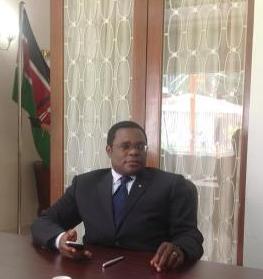| 
Ken Lusaka, Governor of Bungoma
Kenya's devolved system of governance, geared toward bringing services, resources and power closer to the people, has spread to 47 counties across the country.
Bungoma, one ofKenya's counties, has emerged as an example of the country's best performing areas, according to a recent report released by the NGO Transparency International.ChinAfrica'scorrespondentJames Musukuya recently spoke toKen Lusaka, Governor of Bungoma, onKenya's successful decentralization of government and howChina's aid has helped counties self-govern. Excerpts of the interview follow:
ChinAfrica: Why do you think devolution of government is healthy for society?
Ken Lusaka:To say that it was long overdue forKenyato finally embrace devolution would be a big understatement. In fact, African countries pioneered decentralizing power andSouth Africais a shining example of this.
Beyond bringing services, resources and power closer to the people, the importance of devolution also includes bridging the gap of rural to urban migration, especially the youthful segment of the society in search of employment. The central government had led to a concentration of major employment avenues, like industries and key government and parastatal offices in the capitalNairobi, a scenario that the devolution system is fast changing.
Do you thinkChina's role in Africa, and particularlyKenya, is transforming the continent's economy?
The fruits of Sino-African relations are bountiful. In Kenya for example, former President Mwai Kibaki left a legacy after he turned around the country's economy, not entirely because he is an economics genius, but [also] thanks to tapping into Kenya's bilateral ties with China.
Kenya's new president, Uhuru Kenyatta, whose government is known askusemanakutenda(we say and do), is steadily following in Kibaki's footsteps by associating with the East, and particularlyChina.
Perhaps nothing best exemplifies Kenyatta's love forChina[more] than making it his first official trip as president, outside Africa. I was privileged to be in the president's entourage.
Was tourism an important part of your discussions during theBeijingvisit?
The trip would have been incomplete without courting the Chinese to make full use ofKenya's rich tourism resources.
Ahead of the trip, China Central Television (CCTV), whose Africa bureau office is in Nairobi, broadcast live the spectacular wildebeest migration, ultimately hosting President Kenyatta for interviews right at Kenya's world famous Maasai Mara National Reserve. InBeijing, we lobbied for the county's tourism sector.
Beyond the spectacular annual wildebeest migration fromKenya's Maasai Mara National Reserve toTanzania's Serengeti National Reserve over the Mara River, Kenya has an extensive tourism portfolio that the Chinese are already tapping into.
With 41,000 Chinese tourists flying into Jomo Kenyatta International Airport last year alone, it cannot be denied thatKenyais fast becoming a desired tourist destination forChina. It's even more inspiring that the Kenyan Ministry of Tourism asserts that the figure given above is 10.4 percent higher, year on year.
While facts, figures and statistics exist to explainChina's support forKenya's economy through tourism, a cursory observation also attests to promising future prospects for more arrivals of Chinese tourists inKenyaand the continent. An example is that the Chinese recently established Eastlands, a five star hotel inNairobi, the first Chinese hotel of its kind in Africa.
What are the key investment opportunities you think Bungoma can offer Chinese investors?
Can any county be successful without opening the door to investors?
The investment opportunities in Bungoma abound across the sectors of communication and ICT, tourism, real estate, trade and industry and banking. In the agricultural sector for example, there's great and untapped potential in the processing and branding of coffee and maize flour for export.
As a county, we will give prospective Chinese investors support to establish businesses. We will be having two major investment workshops, one inChinaand another one in Bungoma, as a strategy to woo Chinese investors. During the workshops, the list of potential investment opportunities in the county and other important information for investment will be unveiled.
(Reporting fromKenya)
|